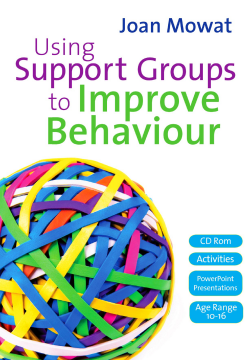
Additional Information
Book Details
Abstract
Based on material that has been successfully tried and tested, this book provides an example of a whole school approach to setting up and managing support groups to improve the behaviour of pupils with social, emotional and behavioural difficulties. Suitable for both primary and secondary schools, the strategies in the book align with the aims of the new Primary National Strategy and Key Stage 3 Strategy on behaviour and attendance, as well as the SEAL (Social and Emotional Aspects of Learning) curriculum, the Scottish 'Curriculum for Excellence' and 'Happy, safe and achieving their potential' (the standard of support for children and young people in Scottish schools). The book explains the aims of the support group approach, and gives practical advice on: - planning for and setting up a support group. - involving parents in the process. - assessing pupils' progress. - the role of the Support Group Leader. - evaluating the implementations of the approach. - how this approach supports new initiatives in behaviour & attendance. An accompanying CD contains everything necessary for implementing the approach outlined in the book, along with resources to support staff development. Teachers, Staff Development Co-ordinators, LEA Behaviour Support Teams, Teacher Educators, Student Teachers and Pastoral Care Teachers will find this an excellent and useful resource. Joan Mowat is Lecturer in Education at the University of Strathclyde. She was previously a Deputy Headteacher in a secondary school, working with pupils with social, emotional and behavioural difficulties, and a former National Development Officer for the Scottish initiative 'Better Behaviour - Better Learning'.
Table of Contents
| Section Title | Page | Action | Price |
|---|---|---|---|
| Preface | |||
| Part 1 | |||
| Introduction: War and peace: what do women | |||
| contribute? | |||
| Haleh Afshar | |||
| The 'sex war' and other wars: towards a feminist approach to peace building | |||
| Donna Pankhurst | |||
| Women and wars: some trajectories towards a feminist peace | |||
| Haleh Afshar | |||
| Developing policy on integration and re/construction in Kosova | |||
| Chris Corrin | |||
| Kosovo: missed opportunities, lessons for the future | |||
| Lesley Abdela | |||
| Training the uniforms: gender and peacekeeping operations | |||
| Angela Mackay | |||
| Palestinian women, violence, and the peace process | |||
| Maria Holt | |||
| Women and conflict transformation: influences, roles, and experiences | |||
| Ann Jordan | |||
| Fused in combat: gender relations and armed conflict | |||
| Judy El-Bushra | |||
| Women in Afghanistan: passive victims of the borga or active social participants? | |||
| Elaheh Rostami Povey | |||
| Part 2 | |||
| Introduction: Peace and reconstruction - agency and agencies | |||
| Deborah Eade | |||
| Relief agencies and moral standing in war: principles of humanity, neutrality, impartiality, and solidarity | |||
| Hugo Slim | |||
| Aid: a mixed blessing | |||
| Mary B. Anderson | |||
| Women and war: protection through empowerment in El Salvador | |||
| Martha Thompson and Deborah Eade | |||
| Sustainable peace building in the South: experiences from Latin America | |||
| Jenny Pearce | |||
| Training for peace | |||
| Glenda Caine | |||
| Making peace as development practice | |||
| Sumaya Farhat-Naser and Gila Svirsky | |||
| Building bridges for peace | |||
| Rola Hamed | |||
| Human security and reconstruction efforts in Rwanda: impact on the lives of women | |||
| Myriam Gervais | |||
| Mission impossible: gender, conflict, and Oxfam GB | |||
| Suzanne Williams | |||
| Resources | |||
| Index |
